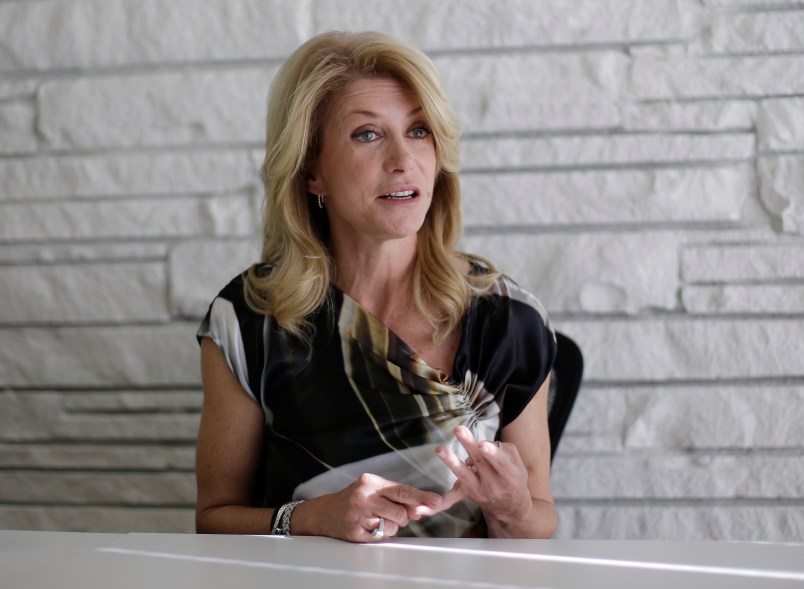Texas state senator—and the candidate that gives Democrats the best shot they’ve had at the governor’s mansion they’ve had in decades—Wendy Davis declared her support for a 20-week abortion ban. She clarified her support in an interview with The Dallas Morning News on Tuesday.
Support for an abortion ban from a politician in Texas wouldn’t be notable except for the fact that last summer Davis rose to national prominence when she filibustered a bill that would severely restrict reproductive rights in the state. That bill included banning abortion after 20 weeks. While the bill eventually passed and became law, sections of it are undergoing a legal challenge.
During the interview, Davis discussed the 20-week abortion ban that is now in effect in the state, pointing out that of the very small number of terminations that occur after this point (less than one-half of one percent of all abortions in Texas), most are done because of serious fetal abnormalities or because the woman’s health is in grave danger.
“I would line up with most people in Texas who would prefer that that’s not something that happens outside of those two arenas,” Davis stated, adding that she could have supported a bill that was only a 20-week ban, as opposed to the omnibus bill that passed last year.
On its face, it would be easy to read Davis’s statement as agreeing with one of the anti-choice movement’s more successful campaigns of recent years: to restrict abortions at an early point in pregnancy than is found in Roe v. Wade. Already, a number of states do ban abortions after 20 weeks, often using the rationale of “fetal pain,” a discredited idea that has not been accepted by any major medical organizations.
And it’s true that Davis’s stated support for a 20-week ban is troubling, particularly coming from a candidate so inextricably connected to the pro-choice movement. But then there’s this: that she could have supported such a ban “if I felt like we had tightly defined the ability for a woman and a doctor to be making this decision together and not have the Legislature get too deep in the weeds of how we would describe when that was appropriate.”
The Texas legislature has shown absolutely no hesitation to go way too far when it comes to telling women what to do with their bodies, and the 2013 omnibus bill was no exception. Davis was not defending the state’s current 20-week ban; she was offering conditional support for a ban on later-term procedures if there is appropriate deference for the pregnant woman and her doctor—and, presumably, including the exceptions for fetal abnormalities and a woman’s health that Davis also supports. That does not bear much resemblance to the larger anti-choice strategy of taking all decision-making power out of the hands not just of a woman’s doctor but the woman herself.
It also doesn’t bear much resemblance to the state’s current law, which not only restricts abortions after 20 weeks but also enacts substantial barriers to women who wish to terminate earlier in their pregnancies. The 2013 bill included a number of measures that had nothing to do with protecting women’s health and everything to do with making abortion care more complicated and expensive for doctors and clinics to provide.
As a result, nine of the state’s 34 clinics have closed—which means that many women in this geographically large state have to travel hundreds of miles, and possibly across state lines, to access safe care. The kind of hypothetical bill that Davis said she could support would not also penalize doctors and clinics, and would not make it more difficult, expensive, and time-consuming for women to access a legal medical procedure.
I don’t agree with 20-week abortion bans. I think they’re arbitrary measures that ignore that both women and fetuses can develop severe health risks beyond this point, and that certain severe fetal abnormalities cannot be reliably diagnosed until after the 20th week.
But I also don’t think that Wendy Davis has just made a drastic shift to the anti-choice side, or that she is not a strong champion for reproductive rights. Her comments reflect the complexity of the issue and serve as a necessary reminder that an abortion at any number of weeks is a personal choice, and one in which a pregnant woman and her doctor should be given a larger say than any politician.
Sarah Erdreich is the author of Generation Roe: Inside the Future of the Pro-Choice Movement. She lives in Washington, D.C. with her family.






